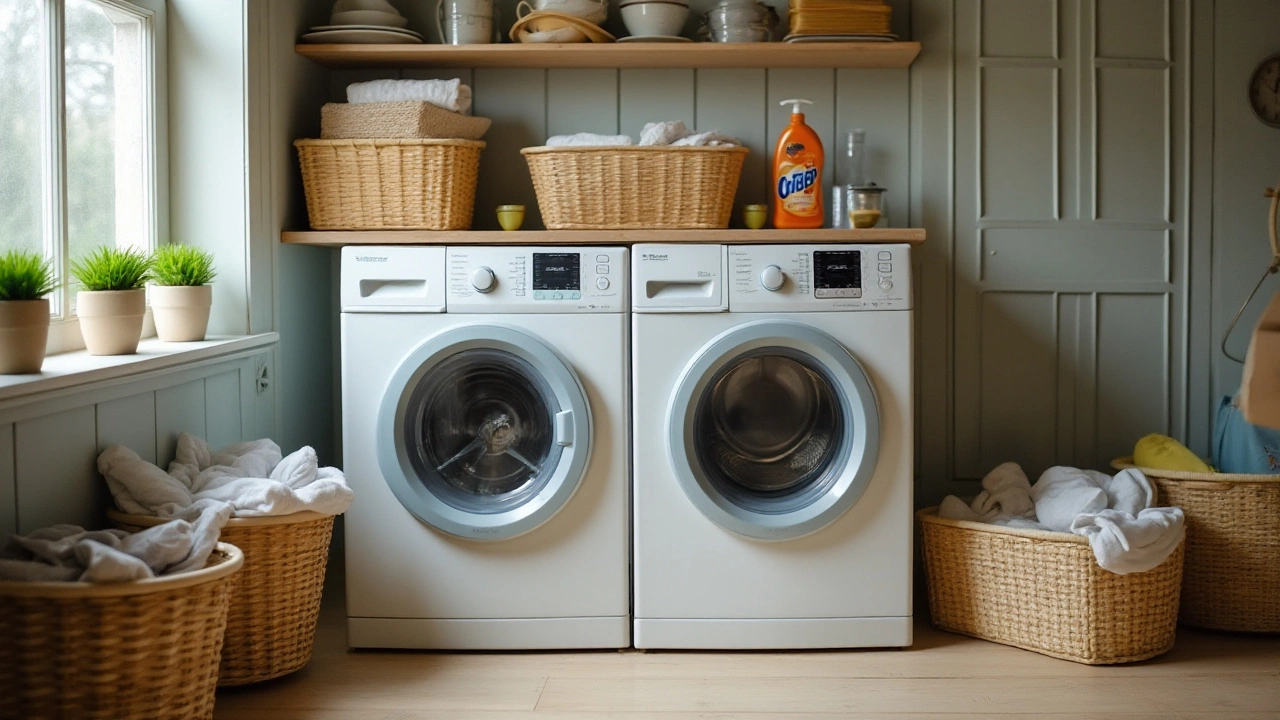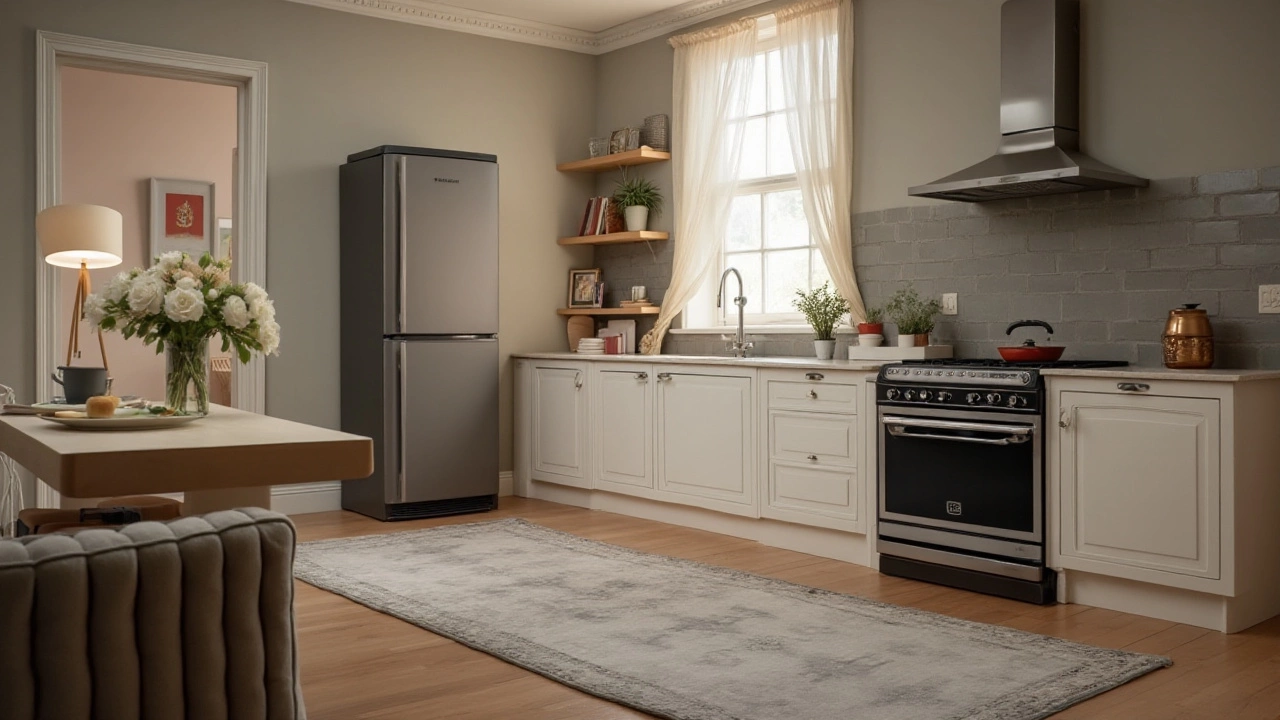Household appliances have become an integral part of modern living, streamlining our daily chores and making life significantly easier. Imagine waking up to a home without the gentle hum of the refrigerator or the comforting whirr of the washing machine—that's a reality we'd prefer to avoid. These trusty gadgets do the legwork, allowing us to focus on more enjoyable pursuits, like spending time with loved ones or indulging in hobbies.
Understanding what makes an appliance tick, and how to keep it running optimally, is something every homeowner should know. Whether it's about recognizing the tell-tale signs of a heater in distress or learning how to extend the lifespan of your oven, this knowledge saves both time and money. In this piece, we’ll take a closer look at what constitutes a household appliance and dive into practical advice on keeping these machines in tip-top shape.
- What Are Household Appliances?
- Examples of Common Appliances
- Importance of Regular Maintenance
- Tips for DIY Appliance Care
What Are Household Appliances?
Household appliances are those essential machines and devices that are found in homes around the world, designed to perform a variety of simple to complex tasks. These gadgets, ranging from refrigerators and ovens to washing machines and vacuum cleaners, have revolutionized the way we conduct our daily routines. The purpose of these appliances is to increase efficiency and convenience in executing household tasks like cooking, cleaning, and food preservation, making life simpler and more comfortable.
To really understand the impact of household appliances, consider the transition from traditional methods to modern-day solutions. Before refrigerators became commonplace, food preservation was a major chore, involving salting or canning. Today, a refrigerator seamlessly keeps our food fresh with minimal effort. Such advancements highlight the importance of these machines in enhancing our quality of life. What's more, the development of appliances has kept pace with technological advances, introducing features like smart connectivity that allow appliances to be controlled remotely via smartphones, and energy-efficient models that help reduce utility bills. Did you know that the average household in America contains more than three televisions and nearly every home has a microwave? Clearly, appliances aren't just tools; they’re necessities.
A significant aspect of household appliances is their classification, which is generally based on their functions and purposes. At a high level, these can be categorized into major and small appliances. Major appliances, also known as white goods, are typically more substantial machines like washers, dryers, ovens, and dishwashers. Small appliances, or brown goods, include items such as toasters, microwave ovens, coffee makers, and hairdryers. Usually portable and often stored away when not in use, these smaller devices are engineered to perform particular tasks effectively. A fascinating statistic reveals that over 87% of households own a coffee maker, underscoring the prevalence of even the smallest convenience tools in our homes.
When it comes to choosing household appliances, consumers often look at factors like energy efficiency, reliability, cost, and design. An appliance that is energy efficient will not only save on electricity bills but also contribute positively to environmental conservation efforts, aligning personal needs with larger global issues. These machines also reflect broader trends in home living, where sleek designs and smart functionalities are becoming integral to the modern household. As the industry evolves, consumers benefit from innovations in technology that produce quieter machines, more intuitive interfaces, and greater connectivity options. In the words of Thomas Edison, "The value of an idea lies in the using of it." Household appliances are perfect embodiments of ideas put to practical use.
As new models emerge with each passing year, spending the time to research and understand the capabilities of household appliances can lead consumers to make informed decisions that improve their home environment. Moreover, the consideration of brand reputation and reviews can be critical, as these often reflect the longevity and performance of the appliance. As someone in the industry noted, "Household appliances are no longer just about functionality; they are about delivering an experience." Indeed, engaging with these marvels of technology goes beyond mere utility; it reflects a lifestyle of comfort and advancement.

Examples of Common Appliances
In today’s fast-paced world, household appliances are indispensable guardians of our time and convenience. Think of these appliances as the unsung heroes that turn our living spaces into sanctuaries of comfort and efficiency. Let’s explore some of these reliable companions that make our daily routines a breeze.
First up, the refrigerator—a staple in every kitchen. Its critical role in preserving our food is something we often take for granted. Did you know that the first electric refrigerator was introduced to the home in 1913? Today’s models are a marvel of technology, boasting features like smart connectivity and energy efficiency, keeping food fresh while trimming down utility bills. Moving on, we have the washing machine, which has revolutionized the way we manage laundry. Before its invention, laundry was a labor-intensive task usually done by hand or in communal washhouses. Modern machines now come with multiple wash cycles and eco-friendly options, effectively saving water and energy.
Another indispensable unit is the dishwasher. No more standing over the sink for hours scrubbing dishes—a luxury, especially after big gatherings. The dishwasher not only saves time but also conserves water and energy by using less than manually washing in most cases. Why stop there? Let’s not forget the microwave oven, which zaps our meals ready in minutes. Introduced to home kitchens in the 1960s, it originally gained popularity due to its remarkable speed and versatility. Today, sophisticated models come with preset cooking options and even grilling features, making them a versatile tool in any kitchen. In a survey from 2022, it was found that about 95% of U.S. households own a microwave oven—a testament to its utility.
There’s another critical player worth mentioning—the vacuum cleaner. Since its inception, it has made cleaning not just easier but more effective. Early versions of this appliance were bulky and not very user-friendly; however, with advancements, we've seen the rise of lightweight, cordless, and robotic models. These innovations have made keeping our homes clean less of a chore and more of an automated process that can even be controlled remotely. For entertainment lovers, the TV is yet another cornerstone of leisure, having evolved from black-and-white to the vibrant, high-definition smart screens we enjoy today. According to the Federal Communications Commission (FCC), an average American household spends about 23% of its electricity budget on appliances, highlighting the importance of choosing energy-efficient models.
"Appliances are not mere utilitarian objects; they are the backbone of a household," remarked Jenna Rodriguez, a home systems expert.
When deciding on these appliances, consider factors such as size, capacity, energy efficiency, and features that match your lifestyle needs. The market is flooded with choices, so it’s wise to prioritize based on the specific tasks you need them to perform. Remember, a well-chosen appliance not only enhances comfort but also contributes to a sustainable household by conserving resources.

Importance of Regular Maintenance
Regular maintenance of household appliances isn’t just a recommendation; it’s a necessity for any home that values efficiency and cost-effectiveness. Keeping up with maintenance ensures that appliances run smoothly and efficiently, minimizing wear and tear that could otherwise shorten their lifespan. When appliances work optimally, they consume less energy, which is not only good for the environment but also for your wallet. Saving on energy bills is one common benefit that many homeowners overlook but come to appreciate once they start adhering to regular maintenance schedules.
Imagine a world where your refrigerator stops regulating its temperature consistently or your washing machine starts making unusual clanking noises every spin cycle—these inconveniences can often be traced back to lapses in maintenance. By routinely inspecting and servicing appliances, small issues can be nipped in the bud before they develop into costly repairs or replacements. Whether it’s as simple as cleaning the filters in your dryer or more complex tasks like checking the coils in your refrigerator, dedicating the necessary time for these checks can translate into significant savings in the long run.
"An ounce of prevention is worth a pound of cure," aptly describes the value of maintaining household appliances—and it’s a thought echoed by leading experts in the appliance industry.
The consequences of neglect are tangible and include an increased risk of breakdowns, inefficiencies, and potentially hazardous conditions, which not only disturb your home life but can also unexpectedly hit your finances. For instance, a well-maintained oven ensures your culinary creations are evenly cooked to perfection while consuming minimal electricity. Regular maintenance checks might reveal accumulated grease or damaged heating elements that need addressing, preventing possible fire hazards or uneven cooking results.
Establishing a routine can be quite straightforward. Start by consulting the user manual of each appliance, which usually includes a recommended maintenance schedule. Simple tasks like cleaning the air filter in your HVAC system monthly or checking the water filter in your water dispenser can prevent future headaches. Investing a little bit of time can save a lot of money and stress later on. To assist homeowners, I’ve put together a basic checklist:
- Inspect appliance cords and plugs for damage.
- Clear dust and debris from appliance vents and filters.
- Regularly check hoses and connections for signs of wear or leaks.
- Follow manufacturer’s cleaning protocols for each appliance.
In essence, maintaining your appliances is like maintaining the health of your household. Not only does it extend the life of the appliances themselves, but it also ensures the environment in which they operate remains safe and efficient for everyone. Dedicate some time regularly to this simple yet vital task and enjoy a home that operates like a well-oiled machine.

Tips for DIY Appliance Care
Handling maintenance on household appliances might seem daunting at first, but with a little elbow grease and know-how, you can make those essential gadgets last longer. First and foremost, establishing a routine check is your best ally in ensuring appliances run smoothly. Every few months, take a look at your refrigerator’s condenser coils. Dust and debris love to hide there, and giving them a good clean with a vacuum or a brush can do wonders. While you’re at it, make sure doors seal tight by inspecting the gaskets. Replace them if they’re brittle or cracked. These steps are often overlooked, leading to increased energy consumption and wear-and-tear, which nobody wants.
Watch and Listen
Keep an ear out for strange noises, which can be the first alert that something’s wrong. A loud clunk from your washing machine or an unusual beep from the microwave may signal issues that demand urgent attention. Educate yourself on what normal operation sounds like—making the unfamiliar recognizable could save you a heap of trouble and expense. A drip, a whistle, or a hum a step louder than usual might just need a tiny adjustment or a tightening of a bolt, which is certainly more manageable than handling a breakdown.
A watched machine is a well-tuned machine, as the old saying goes, "An ounce of prevention is worth a pound of cure." Regular checks could prevent small issues from becoming bigger, costly repairs.
Pay Attention to Filters
Tend to filters with regularity, as clogged filters can result in inefficient appliance performance. For instance, your furnace filter should be cleaned or replaced every one to three months depending on how you use it. Don't skip your dryer vent either. A blocked dryer filter isn’t just a burden on the machine; it could also pose a fire hazard. It’s amazing how brushing away a bit of lint can keep you safe. Filters are among the easiest DIY fixes, yet incredibly crucial. When replacing them, make sure you select the correct size and type for your particular model.
Keep It Level
You'd be surprised how important it is to ensure appliances are level. This might seem trivial, but an unlevel washing machine or refrigerator can lead to a variety of problems such as unnecessary vibrations or leaks. Use a leveler on these heavy-duty tasks, especially when moving them, as any tilt could hinder their effectiveness and longevity. In the case of a refrigerator, it must be sitting perfectly to keep things properly chilled and prevent warm air pockets.
Investing time in these simple appliance service measures goes a long way. Should you find yourself venturing beyond your comfort zone during a DIY attempt, it’s sensible to call in a professional. Knowing when to step back and bring in expert help can save you from compounding issues. Mastering the art of appliance maintenance is like learning to care for a beloved pet—it’s not just about fixing things, it’s about nurturing a reliable companion that serves your household needs.

